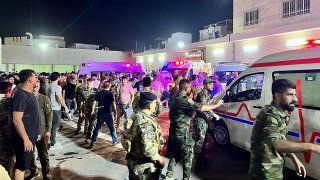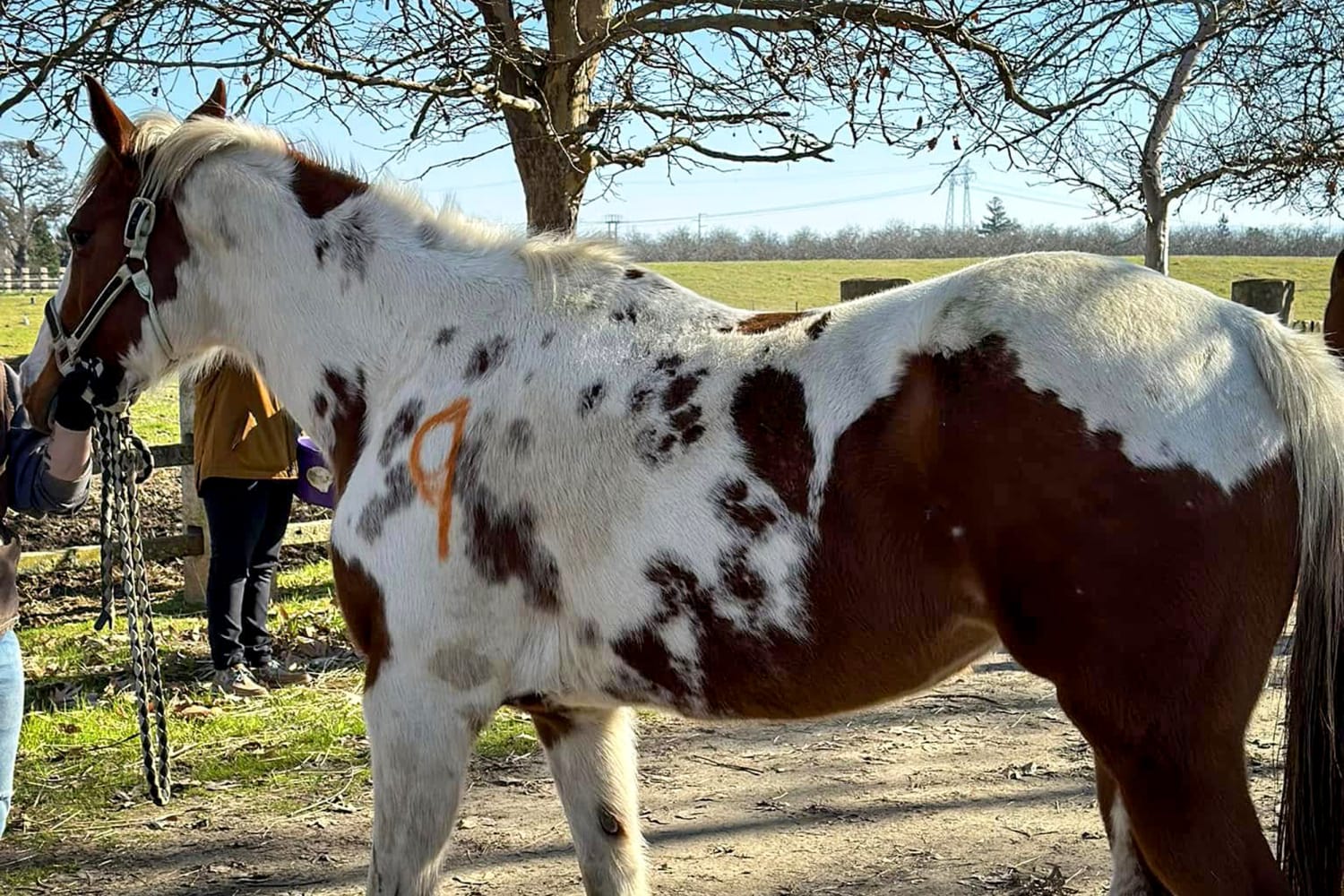
A raging fire seemingly caused by fireworks set off to celebrate a Christian wedding consumed a hall packed with guests in northern Iraq, killing around 100 people and injuring 150 others as authorities warned Wednesday the death toll could still rise.
Authorities said that flammable building materials also contributed to the latest disaster to hit Iraq’s dwindling Christian minority. In the fire's chaotic aftermath, officials offered conflicting death tolls and security officials said they detained staff at the wedding hall as part of their investigation.
The fire happened in the Hamdaniya area of Iraq’s Nineveh province, authorities said. That's a predominantly Christian area just outside of the city of Mosul, some 335 kilometers (205 miles) northwest of Baghdad.
There was no official word on the cause of the blaze, but the Kurdish television news channel Rudaw aired footage showing pyrotechnics shooting flames up from the floor of the event and setting a chandelier aflame.
Get Tri-state area news delivered to your inbox. Sign up for NBC New York's News Headlines newsletter.
After the blaze, charred metal and debris could be seen as people walked through the scene of the fire, the only light coming from television cameras and the lights of onlookers’ mobile phones.
Survivors arrived at local hospitals in bandages, receiving oxygen, as their families milled through hallways and outside as workers organized more oxygen cylinders. Some of those burned included children. Ambulance sirens wailed for hours after the fire as paramedics brought out the injured.
Other footage shown on other local television networks appeared to show the bride and groom on the dance floor when the fire began Tuesday night, stunned by the sight of the burning debris. It wasn’t immediately clear if they were among those hurt.
U.S. & World
“There were about to do a slow dance and then they lit up this thing for the dance which caught fire," one injured woman told Rudaw from a hospital gurney.
Another man injured in the fire at the hospital similarly told Rudaw that the blaze started as the couple prepared for their slow dance.
“They lit up fireworks," he said. "It hit the ceiling, which caught fire.”
He added: "The entire hall was on fire in seconds.”
Extravagant wedding ceremonies are common in Iraq, like many countries in the Middle East. Families often invite hundreds of relatives and members of the broader community, spending heavily on spectacular ceremonies with elaborately decorated halls, music and entertainers, often including pyrotechnics.
Casualty figures fluctuated in the hours after the incident, which is common in Iraq. An initial Health Ministry statement, carried by the state-run Iraqi News Agency, said the blaze killed over 100 people and injured 150. Health officials in Nineveh province put the death toll at 114.
A Health Ministry official, speaking to The Associated Press at midday Wednesday on condition of anonymity as he did not have authorization to talk to journalists, put the death toll at 92, with 101 people still receiving medical treatment.
“The death toll is expected to rise as some are in critical condition,” he said.
Ahmed Dubardani, a health official in the province, told Rudaw that many of those injured suffered serious burns.
“The majority of them were completely burned and some others had 50 to 60% of their bodies burned," Dubardani said. “This is not good at all. The majority of them were not in good condition.”
Father Rudi Saffar Khoury, a priest at the wedding, said “It was a disaster in every sense of the word.”
The number of Christians in Iraq today is estimated at 150,000, compared to 1.5 million in 2003. Iraq’s total population is more than 40 million.
Over the past two decades, Iraq’s Christian minority has been violently targeted by extremists first from al-Qaida and then the Islamic State militant group. Although the Nineveh Plains, their historic homeland, was wrested back from the Islamic State group six years ago, some towns are still mostly rubble and lack basic services, and many Christians have left for Europe, Australia or the United States.
Prime Minister Mohammed Shia al-Sudani ordered an investigation into the fire and asked the country's Interior and Health officials to provide relief, his office said in a statement online.
Hamdaniya is on Iraq's Nineveh Plains and under the control of its central government, though it is close to and claimed by Iraq's semiautonomous Kurdish regional government. Masrour Barzani, the prime minister of the Kurdish region, ordered hospitals there to help those hurt in the blaze.
The different governments being involved in the response to the fire added to the uncertainty over the blaze's toll.
The United Nations’ mission to Iraq offered its condolences over the blaze as well, describing its staff as “shocked and hurt by the huge loss of life and injuries” in the blaze.
Interior Ministry spokesman Saad Maan in a video from the wedding venue said that the primary forensic report described a “lack of safety and security measures” at the venue. Iraqi security forces arrested nine workers at the venue as part of their investigation, said Abdullah Al-Jabouri, a security official who heads the Nineveh Operations Command.
Civil defense officials quoted by the Iraqi News Agency described the wedding hall's exterior as decorated with a highly flammable type of “sandwich panel” cladding that is illegal in the country.
“The fire led to the collapse of parts of the hall as a result of the use of highly flammable, low-cost building materials that collapse within minutes when the fire breaks out,” civil defense said.
Experts say cheaper sandwich panels don't always meet stricter safety standards, and are especially dangerous on buildings without any breaks to slow or halt a possible blaze. That includes the 2017 Grenfell Fire in London that killed 72 people in the greatest loss of life in a fire on British soil since World War II, as well as multiple high-rise fires in the United Arab Emirates.
Similar panels have been blamed in several previous fires in Iraq. In July 2021, a blaze at a hospital in the Iraqi city of Nasiriyah was determined to have been fueled by sandwich panels. It killed between 60 to 92 people, according to conflicting statements by officials at the time.
___
Associated Press writers Qassim Abdul-Zahra in Baghdad; Kareem Chehayeb and Bassem Mroue in Beirut; and Jon Gambrell in Dubai, United Arab Emirates, contributed to this report.



